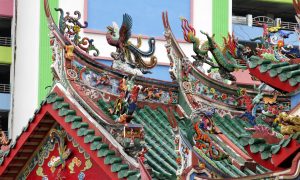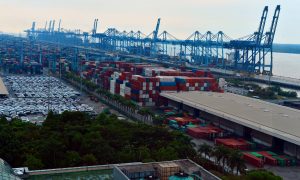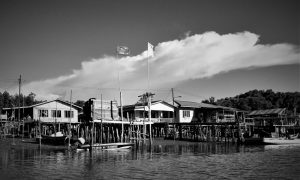Malaysia’s 14th general election (GE14) is not so much a contest between Malays and non-Malays, Muslims and non-Muslims, Islamists and secularists, but more about various competitions of ideas among Muslims of different backgrounds.
With Dr Mahathir Mohamad’s Parti Pribumi Bersatu Malaysia (PPBM, or Malaysian United Indigenous Party) in the Pakatan Harapan (PH) opposition coalition, this election is not a clear-cut contestation between racialised and non-racial politics. With the Islamist party Pas opting out of the opposition group to form its own bloc, and the Pas breakaway Amanah positioning itself as an alternative to Pas, it’s unclear how Islamist-minded Muslims will vote on 9th May at GE14.
Those Malays with Bumiputera policies in mind might vote for the ruling UMNO or PPBM, while Islamist-minded voters might vote for Pas, Amanah, and Anwar Ibrahim’s Parti Keadilan Rakyat (PKR). Of course, Islamism and Bumiputraism do not necessarily oppose each other, and in some cases there are overlaps. Such crisscrossing and fluidity of Malay Muslim politics makes this GE14 highly unpredictable.
Political Islam in Malaysia is not just about an Islamisation race between Pas and UMNO, and there are new, old, and emerging actors in shaping discourses and practices of political Islam today. Instead of a dichotomy between Islamism and post-Islamism, the various spectrums of political Islam are results of entanglements between democratisation and Islamisation processes in Muslim societies.
With the diversity and complexity of political Islam across the different regions of Malaysia, there are political parties, non-government organisations, and popular preachers competing to win over urban Muslim support. We should not assume that there is a clear-cut divide between rural and urban Muslims, or that urban Muslims are a monolithic entity—there are differences depending on educational background and socio-economic status.
Positioning itself as a “third force” and a kingmaker, Pas is struggling to keep its support base intact, ensuring it remains as Malaysia’s only influential Islamic party. Besides Kelantan, Terengganu and Kedah, Selangor is another state where Pas has a strong base among Muslims, with support from blue-collar workers to the middle class and professionals. However, many of these urban pious Muslims are not hardcore Pas supporters—at GE14 they might also vote for Amanah and PKR, as these two parties also have Islamic credentials.
In order to engage with its middle class and youth members, as well as to win over support from a broader set of pious Muslims, Pas leadership knows its religious credentials alone are not enough. Party strategists have recently introduced the idea of “technocratic government” (kerajaan teknorat) and running events such as town hall meetings featuring the party’s youth leaders from professional backgrounds. Yet on other occasions many party ulama and ustaz often declare that Pas is the only party upholding the Islamic agenda in Malaysia, that “Undi Pas, dapat pahala” (Vote Pas, gain rewards in the afterlife). A vote for Pas is akin to a ticket to heaven.
Even though the Pas manifesto does not highlight the controversial parliamentary amendment of the Syariah Courts (Criminal Jurisdiction) Act 1965 (better known in the public debate as RUU 355), in various ceramah (rallies) leaders often mention RUU355 to justify Pas’ split from its former alliance, Pakatan Rakyat, and its criticisms of stalwart opposition party Democratic Action Party (DAP) for not respecting Islam. In industrialised Selangor, Pas is fielding a mixture of professionals and Islamic preachers as candidates, including a non-Muslim Malaysian Chinese. However, despite the perceived warming relations with UMNO, there is dissatisfaction towards Pas’ current leadership and the inconsistent party strategy may cause some of its members to quietly switch their support to PH.
With the leadership of former Pas progressives and activists from IKRAM (an Islamic NGO), Amanah is positioning itself as an Islamic alternative to Pas. Former Pas and IKRAM leaders might have different opinions on the kind of Islamism Amanah should represent, but they in general agree that the party is endorsing a more inclusive and progressive Islamic agenda, as well as focusing on substance instead of form. Because of this, Amanah leaders advocate Maqasid Syariah, a concept that highlights Islamic values such as social justice, good governance, and multicultural co-existence. The party also claims to represent the spirit of the late Tok Guru Nik Aziz, the highly respected former Pas spiritual leader and Kelantan chief minister.
So far, Amanah has not broken through Pas’ traditional influence in Islamic schools and mosques. But Amanah has been running extensive campaigns on social media to win over pious Muslims while seeking allies in broader Malaysian society. Amanah did not perform well in two 2016 by-elections but that failure is not a good indicator of the party’s prospects at GE14, especially in urban and peri-urban seats. The nomination of Nik Omar, the eldest son of Nik Aziz, as a candidate of Amanah in Kelantan has also boosted the party’s religious credentials among pious Muslim voters.
Often overlooked as a party with Islamic credentials is PKR. The Malaysian Islamic Youth Movement (Angaktan Belia Islam Malaysia, or ABIM) has played an important role along with other more secular forces in establishing this multi-racial party. The party’s de facto leader Anwar Ibrahim positions himself as a “Muslim democrat”, and there are many Malay Muslim leaders with strong Islamic backgrounds in the party, many of them activists from ABIM and IKRAM.
Islamic NGOs such as ABIM, IKRAM and ISMA (Ikatan Muslimin Malaysia, or Malaysian Muslim Solidarity) have helped shape the practices of political Islam in Malaysia. These three tarbiyah and dakwah organisations have, in different ways, been influenced by the ideology of the Muslim Brotherhood. Closely associated with Anwar Ibrahim, ABIM has gone through different political engagements at different times over the years. ABIM has taken a moderate approach to political Islam, balancing between global Islamic aspirations with local traditions.
Many of its politically active current and former members are with PKR, some are in Amanah and, to a lesser extent, in Pas and in UMNO. Some ABIM leaders also play important roles in the operation of Darul Ehsan Institute (IDE), a think tank associated with the PKR-led Selangor state government. IDE promotes the idea of Maqasid Syariah and claims that the Selangor government is implementing Islamic values with its good governance. It is important to note that caretaker prime minister Najib Razak is also claiming that the federal government is fulfilling Maqasid Syariah. What constitutes Maqasid Syariah, and how this has been deployed by different groups and for different reasons deserves further analysis.
IKRAM, formerly Jemaah Islam Malaysia (JIM), is another active player in contemporary Malaysian Muslim politics. IKRAM is ideologically rooted in the Muslim Brotherhood. It has close relations with the Prosperous Justice Party (PKS) in Indonesia. Yet, unlike PKS which is perceived as being exclusive and conservative in Indonesia, IKRAM is seen in a Malaysian context as being inclusive and progressive. It has developed close relationships with non-Muslims in various social movements such as Bersih 2.0, the electoral reform group. A wing of IKRAM, Hidayah, has also been running Chinese New Year celebrations in mosques, to promote the idea that Islam is a blessing for all.
Since 1998, when the sacking and jailing of Anwar Ibrahim sparked off the reformasi movement in Malaysia, some IKRAM activists joined opposition politics, mainly in Pas and PKR. In 2015, together with former Pas leaders, IKRAM members played a vital role in the forming of Amanah. Almost half of the grassroots leaders of Amanah have IKRAM backgrounds. In GE14, many IKRAM members are campaigning for the opposition coalition, especially for Amanah candidates. Citing Indonesia as an example, many Amanah and IKRAM leaders have reasoned that it would be good for Malaysia to have more than just one Islamic party. The election results will show if Amanah can legitimise itself as an Islamic alternative to Pas. A big challenge for Amanah and also IKRAM is that their leaders and members are mainly from the educated urban middle class and professionals, raising questions whether they can appeal to the broader Malay Muslim community.
Even though its exclusionary messages do not represent the views of many Malay Muslims, ISMA has made news headlines for its controversial statements, for example when it insulted Chinese Malaysians by calling them foreigners (pendatang). ISMA shares similar features as IKRAM, as both groups are influenced by the Muslim Brotherhood and their members are mostly educated, urban Muslim middle classes and professionals. Yet, unlike IKRAM, ISMA is more Malay-centric and less inclusive. In the previous 13th general election (GE13), ISMA contested in some seats as a “third force” under the flag of Berjasa, a small Islamic party, because it disagreed with Pas’ electoral pact with DAP. In this GE14, ISMA withdrew itself from contesting, instead positioning itself as an electoral pressure group.
ISMA launched a campaign called “Voter Awareness Movement” (Gerakan Pengundi Sedar, or GPS) and urged Muslims to vote for “credible Muslim candidates” (calon Muslim berwibawa). According to ISMA, a credible Muslim leader should be free from corruption, morally good, and uphold the Malay Muslim agenda. Even though it claims to be neutral, ISMA has often criticised the DAP and Muslim leaders in the opposition coalition. As its online campaigns have shown, ISMA tries to stimulate moral panic (over issues such as LGBT rights and alcohol consumption) and encourages a siege mentality among Malay Muslims (over issues such as alleged Christianisation and losing political power to “foreigners”). However, given that PH has accommodated elements of Bumiputraism and Islamism, the ISMA campaign is unlikely to have a major impact among Muslim voters.
In Indonesia, even though it did not run for elections, Hizbut Tahrir Indonesia (HTI) was politically influential, and it was a key actor behind the mobilisation against former Indonesian governor, Basuki Tjahaja Purnama (popularly known as Ahok). However, in Malaysia, despite gaining followers, the local branch of this anti-democracy, transnational Islamist group, Hizbut Tahrir Malaysia (HTM), has had very little impact on Malaysian politics.
A ‘Malay Malaysia’, but in what sense Islamic?
The Najib government needs to win new legitimacy at GE14 if it's to juggle Malay, Islamic, and royal claims, amid a restive East Malaysia.
There are many Muslim activists and intellectuals in Amanah and PKR. Recently, Maszlee Malik, a prominent Muslim intellectual, lecturer and activist joined PPBM and is running as a candidate for a parliament seat in Johor state. He is also an active IKRAM member. In UMNO, the leading Islamic figure is Asyraf Wajdi, who is contesting in Kelantan. He was the former Deputy Minister in the Prime Minister’s Department, in charge of religious affairs. He was once the president of PKPIM, a student wing of ABIM. Both Maszlee Malik and Asyrat Wajdi were former lecturers at the International Islamic University of Malaysia.
In short, besides Pas, there are many actors in political parties and NGOs, and preachers who are playing increasingly important roles in reshaping discourses and practices of political Islam in Malaysia. Which version of political Islam is more appealing among pious urban Muslims? Although Islam is a prominent issue, it is not the only determining factor in Muslims’ voting decision. The election results may not entirely reflect what Malaysian Muslims think of Islamism, but it might be a good indicator of the development and transformation of political Islam in Malaysia.
 Facebook
Facebook  Twitter
Twitter  Soundcloud
Soundcloud  Youtube
Youtube  Rss
Rss 



